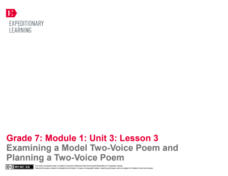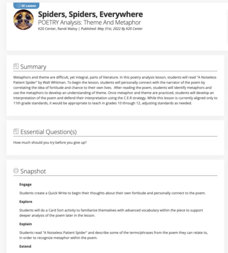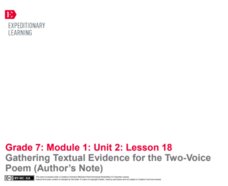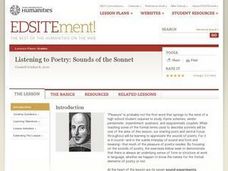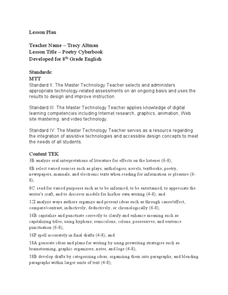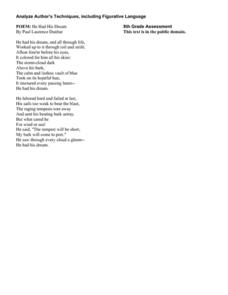Curated OER
1900 America: Primary Sources and Epic Poetry
Using Walt Whitman's Song of Myself and Hart Crane's The Bridge as models, class groups first craft their own epic poems for 1900 and, using primary sources, create a multi-media presentation that captures the sights and sounds of life...
KIPP 3D Academy
Epic Poetry Unit
The Odyssey is the core text in this unit study of the hero's journey motif. Along the way, kids research Greek and Roman history, mythology, art, and epic poetry. The 104-page packet is perfect for homeschool or classroom situations and...
Curated OER
Using Poetry As Inspiration for Composition
A reading of Robert Frost’s "The Road Not Taken" launches an interdisciplinary study of the connection between the meters of a poem and a melody. After identifying the number of beats in each line of the poem, young musicians use...
Crafting Freedom
George Moses Horton: Crafting Virtual Freedom Through Poetry
What is "virtual freedom"? How about "enslaved entrepreneurship"? Class members will learn about these terms and much more as they read the poems and examine the life of George Moses Horton.
Curated OER
Poetry Analysis Sheet
Tasking class members to analyze a poem can strike fear into the hearts of many learners. Here's a activity that takes the mystery out of the process by providing questions about what to look for in the text and to the devices poets use...
EngageNY
Analyzing, Comparing, Sharing: Modern Voices
What do modern voices sound like? Scholars explore the topic, reading two concrete poems from John Grandit's Blue Lipstick and analyzing them using a graphic organizer. Next, they read a third poem and work with partners to look for...
Curated OER
Poems that Tell a Story: Narrative and Persona in the Poetry of Robert Frost
Students investigate and explore the poems of Robert Frost. They read and discuss poems by Frost, define narrative and personal, write narratives in a journal, and present a dramatic reading of a poem to the class.
EngageNY
Analyzing and Discussing: Modern Voices
This is the way we go to school. Scholars take a look at two poems about different ways to get to school, TyrannosaurBus Rex and Point A to Point B. Pupils work in triads to analyze the poem images and determine the theme.
EngageNY
Examining a Model Two-Voice Poem and Planning a Two-Voice Poem
Successful poetry writing requires three P's: planning, preparation, and practice. Pupils read a model two-voice poem and discuss how the author uses evidence to develop the theme. With a partner, scholars use a rubric to analyze the...
K20 LEARN
The History of Spoken Word Poetry: Historical and Cultural Perspectives In Literature
Spoken word poetry, more than almost any other form, reveals the historical and cultural perspective of the poet. High schoolers listen to various spoken word poems, select one to research in-depth, and then apply what they have learned...
K20 LEARN
Where I'm From: Poetry
We carry memories of where we're from; tweens and teens can capture these memories by first listening to several memory poems and then crafting their own. They analyze literary devices other poets use, brainstorm a list of images they...
K20 LEARN
Spiders, Spiders, Everywhere: Poetry Analysis - Theme And Metaphor
Walt Whitman's poem "A Noiseless Patient Spider" provides high schoolers an opportunity to reflect on the importance of perseverance and fortitude. After drafting a Quick Write about a time they tried and tried again to accomplish...
EngageNY
Gathering Textual Evidence for the Two-Voice Poem (Author’s Note)
Writers take a look at how to gather evidence from the information text in the unit that connects to Salva and Nya’s story. They complete a Gathering Evidence from Informational Texts sheet to guide their work. Pupils then use the...
EngageNY
Analyzing the Significance of the Novel’s Title: Connecting the Universal Refugee Experience to Inside Out and Back Again, Part 3
What does it mean to mourn something? Scholars continue reading paragraph four from "Refugee and Immigrant Children: A Comparison" to better understand the mourning process for refugee children. Working with a partner, pupils then read...
Curated OER
Poetry In Motion
Fourth graders read and analyze poetry and examine the process of writing poetry. They read and analyze the poem "From a Railway Carriage" by Robert Louis Stevenson, and answer comprehension questions. They identify the similes,...
Curated OER
Poetry: Basic Elements of a Poem
People who pen poetry positively need to know basic tenets and terms of poetry, like alliteration and consonance, for example. These and other terms are define and illustrated. Then viewers are given an object and asked to craft a...
National Endowment for the Humanities
Thirteen Ways of Reading a Modernist Poem
High schoolers analyze modernist poetry and the role of speaker in example poems. Learners study modernist poems from the Romanticism and Victorian periods as well as Wallace Stevens' "Thirteen Ways of Looking at a Blackbird." Using a...
National Endowment for the Humanities
In Emily Dickinson's Own Words: Letters and Poems
Analyze the depth and beauty of American Literature by reading Emily Dickinson's letters and poems. The class analyzes Dickinson's poetic style and discusses Thomas Wentworth Higginson's editorial relationship with Dickinson. They pay...
National Endowment for the Humanities
Walt Whitman to Langston Hughes: Poems for a Democracy
Explore the idea of democratic poetry. Upper graders read Walt Whitman, examining daguerreotypes, and compare Whitman to Langston Hughes. They describe aspects of Whitman's I Hear America Singing to Langston Hughes' Let America Be...
National Endowment for the Humanities
Emulating Emily Dickinson: Poetry Writing
High schoolers analyze mood and voice in Emily Dickinson's poem, "There's a Certain Slant of Light." After the analysis, students write a poem of their own emulating the Dickinson poem, and then write a one-page essay describing what...
Curated OER
Listening to Poetry: Sounds of the Sonnet
Students investigate how sound influences meaning in poetry by listening to sonnets. They write an analysis after listening to and reading sonnets.
Anti-Defamation League
Understanding and Analyzing “The U.S. of Us” by Richard Blanco
Current immigration issues and the rhetoric surrounding the controversies come into focus with a lesson that uses Richard Blanco's anthem, "The U.S. of Us," written after the August 2019 attack in El Paso, Texas, to open a discussion of...
Curated OER
Poetry Cyberbook
Emerging poets design a website and then post seven original poems as well as their written critique of these poems. Although the resource mentions Inspiration and FrontPage technologies, any software could be substituted.
Curated OER
Analyze Author’s Techniques, Including Figurative Language
Paul Laurence Dunbar's poem "He Had His Dream" is the focus of a quick exercise. Pupils read the poem and answer four multiple choice questions and one short answer question about specific lines in the poem and the author's purpose....










